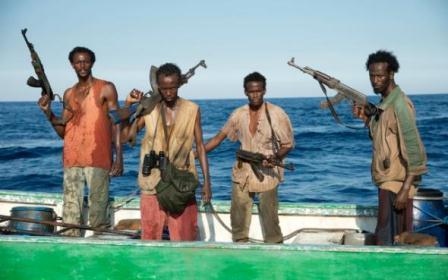Illegal Dumping of Waste led to Somali Pirates: Hiwot Shiferaw

It’s a nagging problem for the powerful governments who benefit from trade along the Somali coast. The issue has led to many films which have become products for entertainment and business around the world.
But hardly do many imagine why the pirates do what they have been accused of doing; the kidnapping of foreigners in ships, requests for ransom money, and even worse, the havoc that ensues in the process. Hiwot Shiferaw explains:
———————————————————————————————————-
In her paper titled Fighting Piracy in Somalia (and Elsewhere): Why More Is Needed, Milena Sterio, a faculty member at Cleveland State University, stated that “They are sea-terrorists, operating on a supra-national level: beyond the reach of any laws, in the name of no particular state, and against no specific nations. They enjoy complete impunity — most of the time, they are simply chased off, and if captured, they are often released.”
And she goes on, “world powers… should be willing to take on the Somali pirates for several reasons”, and lists several reasons and the need to capture and try them in Kenya, in accordance with a signed memorandum between the United Kingdom and Kenya.
Of course, any intelligent person who reads this paper should question where these pirates are coming from.
But let’s not just place the blame on the Somalis.
On a similar attitude of ignoring the root cause of this issue and just blaming the Somalis, the British Broadcasting Corporation (BBC) published an article called, The Plight of Forgotten Somali Pirate Hostages in July 2013. This article talked about hostages that are held by ‘Somali Pirates’ since 2010, and one of the quotes in the article caught my attention.
A. John Steed stated, “Enough is enough. These guys have suffered terribly. It’s time to let them go on humanitarian grounds.”
So if we are talking about “humanitarian grounds” for the hostages, yes absolutely I agree. On that note let us talk about the humanitarian grounds the Somali people are entitled to, which reminded me of a speech by Chimamanda Adichie.
In her TED talk titled The Danger of A Single Story, Adichie said, “Start the story with the arrows of the Native Americans, and not with the arrival of the British, and you have an entirely different story. Start the story with the failure of the African state, and not with the colonial creation of the African state, and you have an entirely different story.”
That seems to be the case here.
It seems to me we are talking about the Somali Pirates, before assessing the main cause of this series of events.
I want to present two of the many reasons why this act of piracy continues, illegal fishing and the dumping of industrial waste.
Joana Ama Osei-Tutu, in her paper titled, The Root Causes of The Somali Piracy, explores the issues surrounding piracy in the Gulf of Aden. Joana found that piracy began with fishermen who were tired of foreign fishing fleets taking advantage of the instability in the country by dumping toxic waste and illegally fishing in the Somali waters. “These activities hampered the economic, environmental, and health of the country and its people,” Osei-Tutu says.
This makes me wonder why all these people who want to fight ‘Somali piracy’ in the name of justice are not making noise for the injustice the Somali people are enduring because of these illegal activities.
At any given year up to 700 international vessels fish at this coast, without regulation, “exploiting species of high value such as deep-water shrimps, lobsters, tuna and sharks.” This makes it almost impossible for small-time Somali fishermen to compete with corporations.
This illegal fishing generates $ 4 to 9 billion a year for these corporations. Let’s put this in perspective for a moment. In terms of the economic value of the lost revenue to the Somali nation, in 2010, this would have amounted to $5.896 billion for Somalia.
In 2005 United Nations Environmental Program (UNEP) confirmed the illegal dumping of waste by industrialized nations. Some of the same nations, Milena Sterio argues, should actively prosecute the ‘Somali pirates.’
But any European country can pay “$250 per ton to dump its industrial waste safely in Europe and $2.50 per ton to dump its toxic waste in Somalia These companies chose the latter, and the political turmoil in Somalia makes it so they can dump waste without consequences.
As environmental justice activists or just as human beings, we should question what kind of “humanitarian grounds” these companies are operating under. The wastes, toxins, environmental damage, diseases resulting from environmental abuse and misuse, etc.. always disproportionately affect under-represented groups, the poor people who have no access to better spaces, and those with little to no political and social power.
Furthermore, it is imperative to recognize that piracy in the Gulf of Aden is a multifaceted issue. Instead of seeing the Somalis just as criminals, how about we recognize the fact they are fighters who have lost their livelihood partly because of international criminal activity.
While I do not pretend to give voice to the ‘Somali pirates’, this piece is not intended to validate any form of piracy. Two wrongs do not make right. All I want to say is, let us be aware of who we are criminalizing and prosecuting, and start telling both sides of the story.
The venerable Chinua Achebe called this “a balance of stories.” Only then can we solve the challenges facing us.

